Daily Vocabulary Words: List of Daily Used Words
Hi there. Welcome to this special section @ Wordpandit.
Our endeavour here is straightforward: highlighting important daily vocabulary words, you would encounter in The Hindu. This is your repository of commonly used words; essentially, we are posting a list of daily used words. Hence, this has significant practical application as it teaches you words that are commonly used in a leading publication such as The Hindu.
Visit the website daily to learn words from The Hindu.
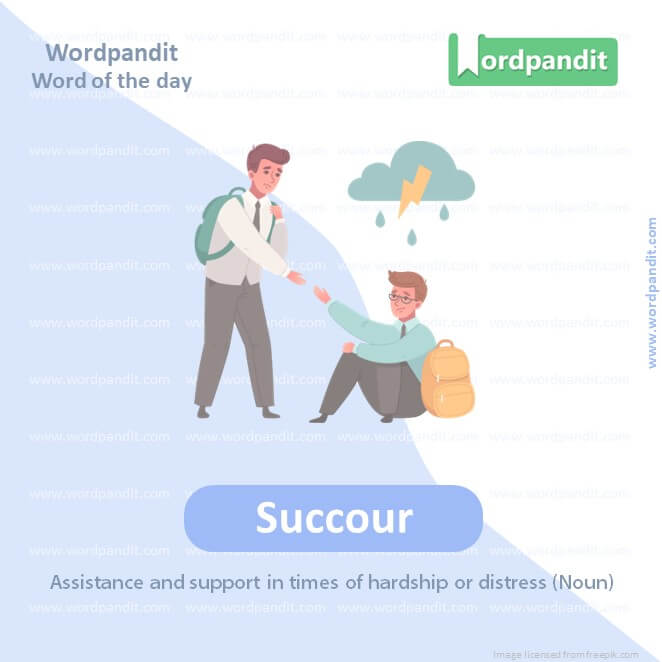
WORD-1: Succour
CONTEXT: The Madras High Court has demonstrated how the judiciary can provide succour to a person waiting for over 40 years to get Indian citizenship.
SOURCE: The Hindu
EXPLANATORY PARAGRAPH: Imagine if you fall and scrape your knee, and someone comes to help you by giving a bandage and a hug. That’s what ‘succour’ means. It’s when someone gives help or comfort to someone else who is in trouble or hurt.
MEANING: Assistance and support in times of hardship or distress. (Noun)
PRONUNCIATION: SUH-ker
SYNONYMS: Aid, Assistance, Help, Relief, Support, Comfort, Solace
USAGE EXAMPLES:
1. The charity provided much-needed succour to the flood victims.
2. She found succour in her friends’ kind words.
3. The government’s aid program was designed to succour those affected by the drought.
4. He offered emotional succour to his friend during a difficult time.
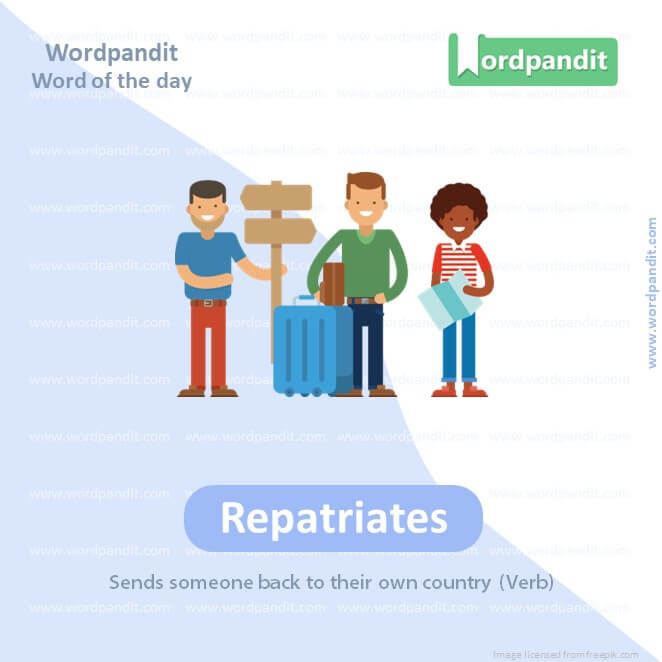
WORD-2: Repatriates
CONTEXT: In T. Ganesan vs The Government of India & Others, the Madurai Bench of the High Court, in its judgment on November 30, directed the authorities to treat the petitioner and his family as Indian citizens, thus extending to them relief measures that the Tamil Nadu government provides to repatriates from Sri Lanka.
SOURCE: The Hindu
EXPLANATORY PARAGRAPH: Think about a bird that flies far away but then comes back to its nest. ‘Repatriates’ are people who return to their own country after being in a different country.
MEANING: Sends someone back to their own country. (Verb)
PRONUNCIATION: re-PAY-tree-ates
SYNONYMS: Return, Send Back, Deport, Re-admit, Relocate, Resettle
USAGE EXAMPLES:
1. The government repatriates citizens stranded abroad during the crisis.
2. After years of living overseas, she decided to repatriate.
3. The refugees were repatriated after the war ended.
4. The company repatriates its employees after their international assignment is over.
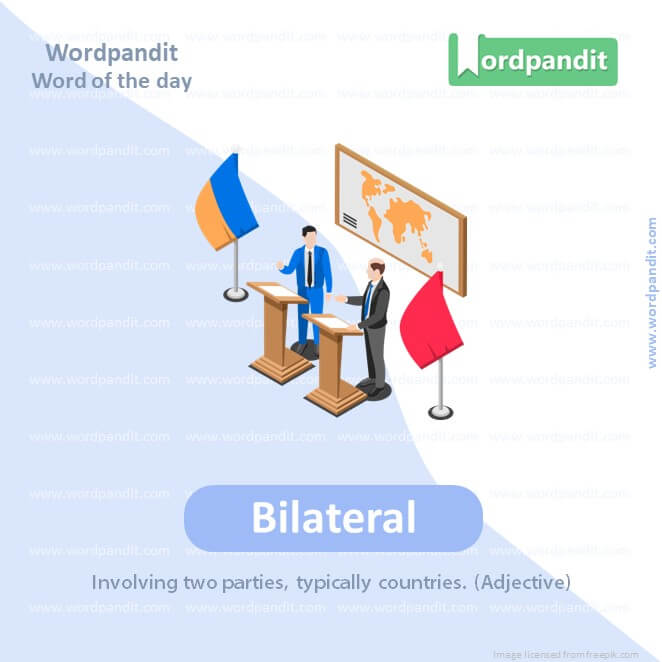
WORD-3: Bilateral
CONTEXT: The 69-year-old petitioner, now a resident of a refugee camp in Karur, reached India in 1990 after having been issued an Indian passport in Kandy in August 1982 on repatriation under two bilateral treaties that concerned hill country Tamils or Indian Origin Tamils (IOT).
SOURCE: The Hindu
EXPLANATORY PARAGRAPH: When you and your friend both share toys with each other, it’s like a ‘bilateral’ agreement. It means something involves two sides or two groups.
MEANING: Involving two parties, typically countries. (Adjective)
PRONUNCIATION: by-LAT-er-al
SYNONYMS: Two-sided, Mutual, Joint, Reciprocal, Cooperative, Collaborative
USAGE EXAMPLES:
1. The two countries signed a bilateral trade agreement.
2. The bilateral talks between the leaders were successful.
3. The treaty was a bilateral commitment to peace.
4. They engaged in bilateral negotiations to resolve the issue.
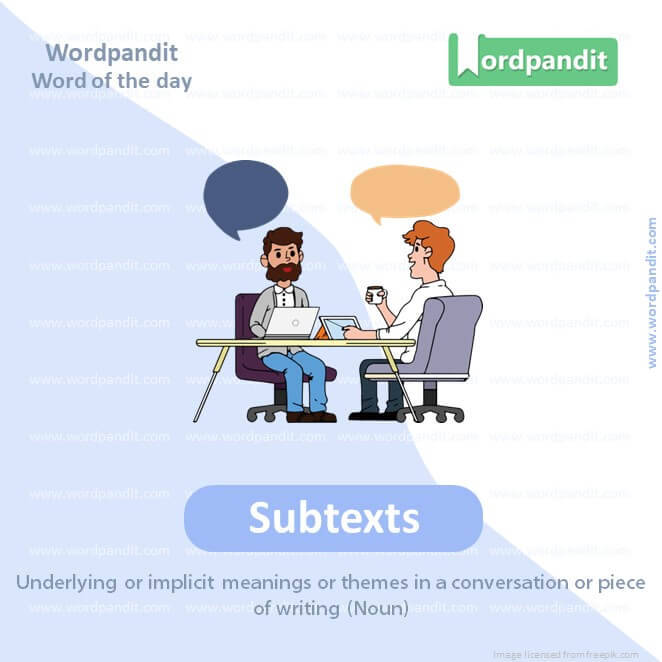
WORD-4: Subtexts
CONTEXT: There are many subtexts underpinning the discussions — negotiations if you will — to operationalise INDIA, the Opposition front, in the run-up to the general elections.
SOURCE: The Hindu
EXPLANATORY PARAGRAPH: Imagine a story where a character says they’re fine, but their sad face tells you they’re not really fine. That sad face is like a ‘subtext’. It’s the hidden meaning or feeling in what someone says or does.
MEANING: Underlying or implicit meanings or themes in a conversation or piece of writing. (Noun)
PRONUNCIATION: SUB-texts
SYNONYMS: Implication, Undercurrent, Undertone, Hidden Meaning, Innuendo, Insinuation
USAGE EXAMPLES:
1. The subtexts in the novel add depth to the storyline.
2. His smile had a subtext of sadness.
3. The dialogue in the play was rich with subtexts.
4. They discussed the subtexts of the political speech.
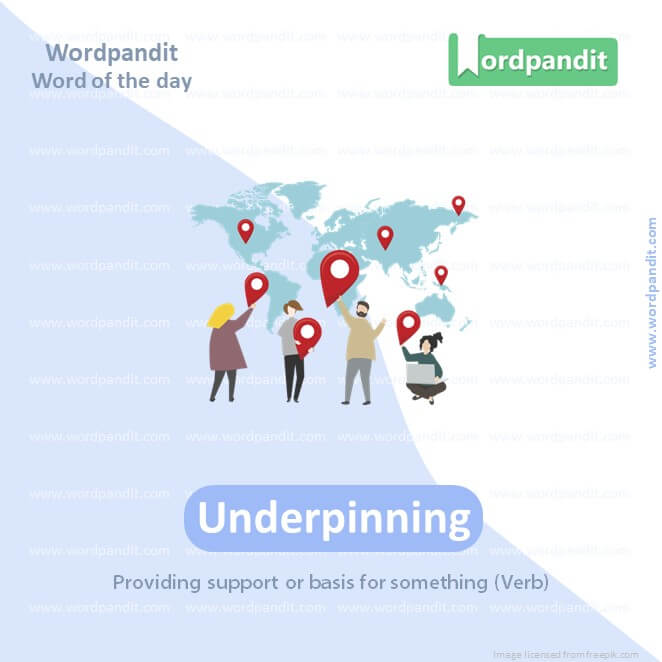
WORD-5: Underpinning
CONTEXT: There are many subtexts underpinning the discussions — negotiations if you will — to operationalise INDIA, the Opposition front, in the run-up to the general elections.
SOURCE: The Hindu
EXPLANATORY PARAGRAPH: Think about the strong bricks under a house that keep it standing. ‘Underpinning’ is like those bricks. It’s the strong support or foundation for something.
MEANING: Providing support or basis for something. (Verb)
PRONUNCIATION: un-der-PIN-ning
SYNONYMS: Supporting, Bolstering, Reinforcing, Strengthening, Backing Up, Shoring Up
USAGE EXAMPLES:
1. The theory is underpinned by extensive research.
2. Good communication skills are the underpinning of a successful team.
3. The pillars are underpinning the structure of the bridge.
4. The values that underpin our society are important.
WORD-6: Premise
CONTEXT: Given that the main premise of the alliance is to put up a single Opposition candidate against the Bharatiya Janata Party (BJP), one of the biggest sticking points is seat-sharing. This is not a trivial issue; the seats any party concedes to the united alliance will be seats where its own party members will be unable to contest. This has implications for intra-party dynamics and party organisation.
SOURCE: The Hindu
EXPLANATORY PARAGRAPH: A ‘premise’ is like the first step of a story or an idea. It’s the basic idea that starts everything.
MEANING: A statement or idea that is the basis for reasoning or a conclusion. (Noun)
PRONUNCIATION: PREM-is
SYNONYMS: Assumption, Proposition, Theory, Hypothesis, Basis, Foundation
USAGE EXAMPLES:
1. The entire argument is based on a flawed premise.
2. The premise of the movie was intriguing.
3. They questioned the premise behind her conclusion.
4. The research began with a simple premise.
WORD-7: Sticking points
CONTEXT: Given that the main premise of the alliance is to put up a single Opposition candidate against the Bharatiya Janata Party (BJP), one of the biggest sticking points is seat-sharing. This is not a trivial issue; the seats any party concedes to the united alliance will be seats where its own party members will be unable to contest. This has implications for intra-party dynamics and party organisation.
SOURCE: The Hindu
EXPLANATORY PARAGRAPH: Imagine trying to solve a puzzle, but there’s one part that’s really hard and stops you from finishing. That hard part is like a ‘sticking point’. It’s a problem or issue that people can’t agree on and stops them from moving forward.
MEANING: Specific issues or problems in a negotiation or discussion that are difficult to resolve. (Noun Phrase)
PRONUNCIATION: STICK-ing points
SYNONYMS: Obstacle, Impediment, Snag, Hurdle, Bone of Contention, Issue
USAGE EXAMPLES:
1. The budget was the main sticking point in the negotiations.
2. They reached a sticking point in their discussions about the contract.
3. The sticking point of the debate was the proposed policy change.
4. Finding a solution to the sticking point was crucial for progress.
WORD-8: Juxtaposed
CONTEXT: The share of seats is also related to the relative strength of the party in post-poll negotiations. It is thus natural that each party would like to maximise its own share of contested seats. But these considerations may seem petty juxtaposed with the larger rubric of ‘saving democracy’ under which the INDIA alliance was stitched together. Thus, the negotiations are likely to pivot around the ‘winnability’ of the parties in question vis-à-vis the BJP.
SOURCE: The Hindu
EXPLANATORY PARAGRAPH: Imagine putting a tiny kitten next to a big dog. They’re very different, right? When things are ‘juxtaposed’, they are placed side by side to show how different they are.
MEANING: Placed close together for contrasting effect. (Verb)
PRONUNCIATION: JUKS-ta-po-zd
SYNONYMS: Contrasted, Compared, Set Against, Collated, Side by Side, Next to Each Other
USAGE EXAMPLES:
1. The modern building is juxtaposed against the historical church.
2. The two paintings were juxtaposed to highlight their differences.
3. Their opinions were juxtaposed in the debate.
4. The article juxtaposed the pros and cons of the policy.
WORD-9: Rubric
CONTEXT: The share of seats is also related to the relative strength of the party in post-poll negotiations. It is thus natural that each party would like to maximise its own share of contested seats. But these considerations may seem petty juxtaposed with the larger rubric of ‘saving democracy’ under which the INDIA alliance was stitched together. Thus, the negotiations are likely to pivot around the ‘winnability’ of the parties in question vis-à-vis the BJP.
SOURCE: The Hindu
EXPLANATORY PARAGRAPH: A ‘rubric’ is like a set of instructions or rules for a game or a test. It tells you what to do and how you will be judged or graded.
MEANING: A set of instructions or guidelines, especially for grading or conducting a task. (Noun)
PRONUNCIATION: ROO-brik
SYNONYMS: Guidelines, Instructions, Criteria, Protocol, Framework, Outline
USAGE EXAMPLES:
1. The teacher provided a rubric for the assignment.
2. The grading rubric made the expectations clear.
3. They followed the rubric for the competition.
4. The project was evaluated according to a strict rubric.
WORD-10: Pivot
CONTEXT: The share of seats is also related to the relative strength of the party in post-poll negotiations. It is thus natural that each party would like to maximise its own share of contested seats. But these considerations may seem petty juxtaposed with the larger rubric of ‘saving democracy’ under which the INDIA alliance was stitched together. Thus, the negotiations are likely to pivot around the ‘winnability’ of the parties in question vis-à-vis the BJP.
SOURCE: The Hindu
EXPLANATORY PARAGRAPH: Think about turning around quickly to face the other way. That’s like ‘pivot’. It means to turn or change direction quickly.
MEANING: To turn or rotate, like a hinge, or to change direction or focus. (Verb)
PRONUNCIATION: PIV-ut
SYNONYMS: Turn, Rotate, Swivel, Twist, Revolve, Shift
USAGE EXAMPLES:
1. The player pivoted to pass the ball.
2. The company pivoted its strategy to focus on digital services.
3. He pivoted in his chair to face her.
4. The discussion pivoted to a new topic.
Vocabulary Daily Use Words
In the architecturally diverse world of language learning, ‘vocabulary daily use words’ act as a cornerstone. We often take these words for granted, but their significance in day-to-day communications is nothing short of monumental. Mastering these ‘vocabulary daily use words’ should be more than an ancillary task on the sideline; it should take the center stage in your language learning journey.
To begin with, approach ‘vocabulary daily use words’ with the same gusto and reverence as you would an untapped treasure chest. Go beyond the conventional realm of textbooks and explore the world of contemporary literature, newspapers, and digital content. By immersing yourself in these mediums, you’re aligning your learning with real-world language usage, thereby gaining a practical understanding of ‘vocabulary daily use words.’
Memory-enhancing tools add an extra layer of effectiveness to your learning. Flashcards, for example, are a great way to make your study sessions interactive and memory-forging. Coupled with the Leitner system, which is a principle of spacing and repetition, you can ensure better recall and understanding of ‘vocabulary daily use words.’
Furthermore, leveraging mnemonic devices aids in etching the ‘vocabulary daily use words’ into your memory. Associating common words with unique and memorable narratives in your mind enhances their recall. Regular revision and using these words in routine conversations further cement your proficiency.
The potency of immersion as a language learning strategy cannot be emphasized enough. Conversing with native speakers, if possible, provides context to ‘vocabulary daily use words’ and boosts your fluency.
In conclusion, mastering the ‘vocabulary daily use words’ is an enriching journey that requires ongoing effort, continual exposure, and hands-on practice. The strategy of learning through various mediums, using memory-enhancing techniques, leveraging mnemonic devices, and immersion can help demystify these words and enhance your overall language proficiency. So, gear up and embrace the linguistic adventure of mastering the ‘vocabulary daily use words.’













